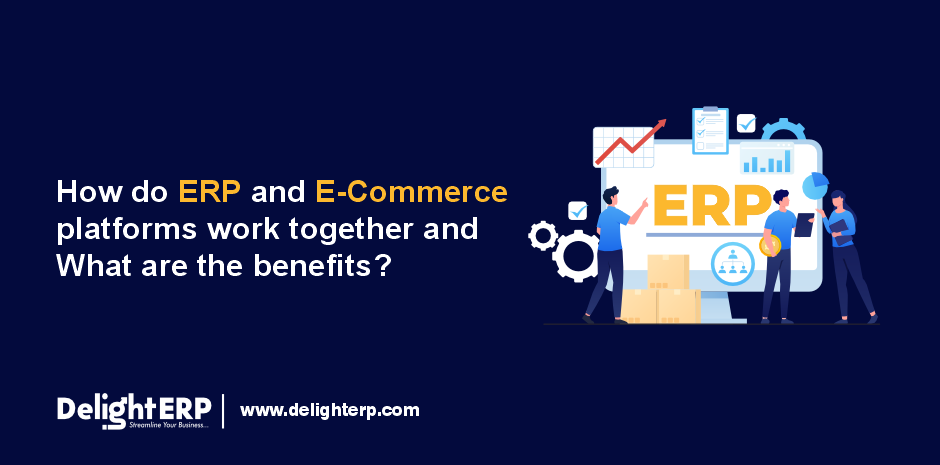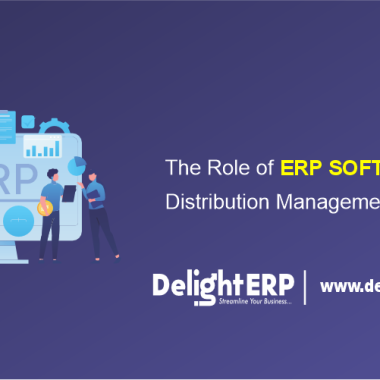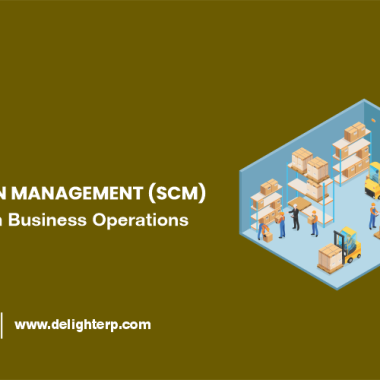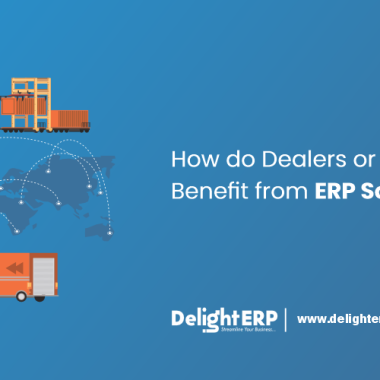ERP Software are comprehensive software solutions that manage and integrate various business processes, such as finance, accounting, procurement, inventory management, human resources, and supply chain operations. They serve as a centralized database for an organization, allowing different departments to access and share information effectively.
On the other hand, e-commerce platforms are web-based applications that enable businesses to sell products or services online. These platforms provide a virtual storefront, product catalogs, shopping carts, payment gateways, and order management capabilities, allowing customers to browse, purchase, and track their orders conveniently.
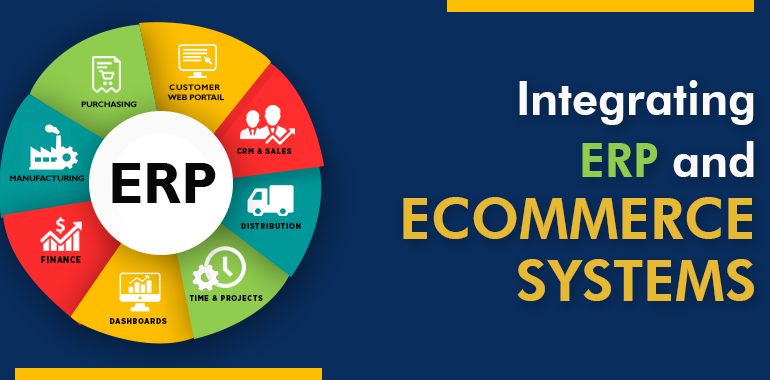
How do ERP and E-Commerce platforms work together?
-
Data Integration
The ERP system is the central storage, storing product information, inventory levels, pricing, and customer details. This data is shared with the e-commerce platform, ensuring accurate and up-to-date information is displayed on the online storefront. Conversely, customer orders and payment details captured on the e-commerce site are transmitted back to the ERP system for processing, fulfillment, and inventory updates. This real-time eliminates manual efforts, reduces errors, and provides a consistent, integrated view across systems.
-
Order Management
Order management integration between ERP and e-commerce platforms streamlines the order fulfillment process. When customers place orders on the e-commerce site, order details and payment information are automatically transmitted to the ERP system. The ERP system then handles order processing, including inventory allocation, picking, packing, and shipping. It also updates inventory levels and generates invoices. Real-time order status is shared with the e-commerce platform, allowing customers to track their orders. This software provides timely order fulfillment while providing customers with a shopping experience.
-
Inventory Management
Inventory management is a critical area where ERP and e-commerce platforms collaborate closely. The ERP system maintains real-time inventory records, tracking stock levels across warehouses and locations. This inventory data is continuously synced with the e-commerce platform, ensuring accurate availability information is displayed to online customers. When orders are placed on the e-commerce site, the ERP system automatically updates inventory levels, allocating stock and preventing overselling. The ERP system deducts quantities from the available inventory as products are shipped. This integration ensures inventory visibility, efficient order fulfillment, and optimal stock management across physical and digital sales channels.
-
Accounting and Finance
The integration of ERP and e-commerce platforms streamlines accounting and financial processes. Sales transactions from the e-commerce platform are automatically recorded in the ERP system’s financial modules. The ERP system handles invoicing, payment processing, and reconciliation for online orders. Financial data, such as sales revenue, taxes, and shipping costs, is consolidated in the ERP’s centralized accounting module. This integration eliminates manual data entry, reduces errors, and provides a comprehensive view of financial performance across all sales channels. Additionally, the ERP system generates reports and insights on profitability, cash flow, and financial metrics, enabling data-driven decision-making for the business.
-
Customer Relationship Management (CRM)
Customer Relationship Management (CRM) integration between ERP and e-commerce platforms enables a unified view of customer data and interactions. The e-commerce platform captures customer information, purchase history, and preferences during online transactions. This data is seamlessly synced with the CRM module within the ERP system, creating a centralized customer database. The ERP system consolidates customer data from various touchpoints, including sales, marketing, and support. This comprehensive customer profile allows businesses to analyze customer behavior, personalize experiences, and deliver targeted marketing campaigns across channels. The integrated CRM capabilities enhance customer engagement, improve retention, and drive sales growth by leveraging data-driven insights.
-
Reporting and Analytics
The integration of ERP and e-commerce platforms enables comprehensive reporting and analytics capabilities. The ERP system consolidates data from e-commerce transactions, inventory management, finance, and other business operations into a centralized database. This data repository allows businesses to generate insightful reports and analytics on key performance metrics such as sales trends, customer behavior, inventory turnover, and profitability. Advanced analytics tools within the ERP system can uncover patterns, identify opportunities, and provide data-driven recommendations for optimizing operations, marketing strategies, and decision-making processes.
-
Automation and Efficiency
The integration of ERP and e-commerce platforms enables automation and efficiency across various business processes. Data is exchanged between the two systems, eliminating manual efforts and reducing the risk of errors. Automated inventory updates, order processing, invoicing, and shipping processes streamline operations and improve accuracy. Real-time data availability allows for efficient decision-making and timely responses to customer demands. Additionally, the integration enables scalability, allowing businesses to handle increased sales volumes and growth without compromising operational efficiency. By leveraging the strengths of both systems, businesses can achieve higher productivity, cost savings, and a competitive advantage in the digital marketplace.
Benefits of ERP Software and E-Commerce platform integration:
Integrating an organization’s Enterprise Resource Planning (ERP) software with its e-commerce platform advantages that streamline operations, enhance customer experiences, and drive business growth. This integration establishes a centralized repository for critical data, including product information, inventory levels, customer details, and order records, ensuring consistency and eliminating data silos across systems. Automated data exchange between the ERP and e-commerce platform reduces manual efforts, and errors, and enables real-time. However, inventory visibility on the online storefront prevents overselling and improves customer satisfaction. By consolidating data from multiple sources, businesses gain access to advanced reporting and analytics capabilities, providing insights into sales trends, customer behavior, and operational performance, enabling data-driven decision-making.
Moreover, it enhances the overall customer experience through accurate product information, seamless order tracking, and timely status updates. Ultimately, the integration of ERP software and e-commerce platforms drives operational efficiency, cost savings, and a competitive advantage in the digital marketplace. Further, empowering businesses to respond agilely to market demands and foster sustainable growth.
Conclusion
The ERP system is the central repository, storing product, inventory, customer, and order information. which is shared with the e-commerce platform for accurate online storefront displays. Conversely, customer orders and payment details captured on the e-commerce site are transmitted back to the ERP for processing, fulfillment, and inventory updates.
Delight ERP has an ERP Software, that helps you to integrate your e-commerce platform with the ERP Software. You can get a free demo for a deep understanding.

